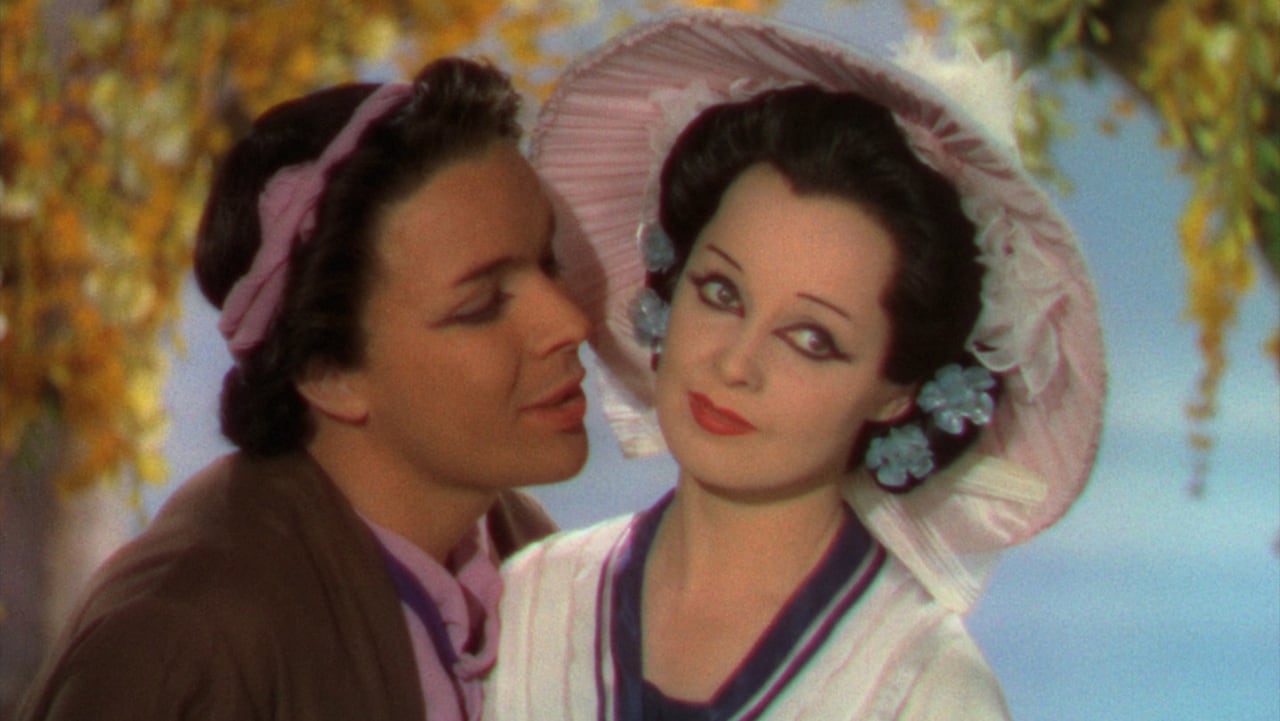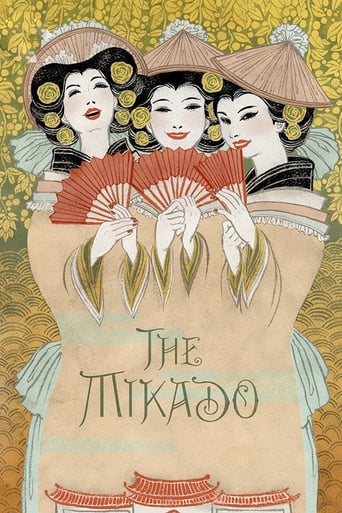



Brilliant and touching
A Brilliant Conflict
It is not only a funny movie, but it allows a great amount of joy for anyone who watches it.
View MoreYour blood may run cold, but you now find yourself pinioned to the story.
View MoreI saw this in 1939 when it was first released ( I was 8 years old ). What I remember most vividly was the fact that the audience was told that if they loudly applauded any number then they would replay it there and then, i.e. give an encore, and they did. I've never seen that done in any cinema before nor did I ever see it done again. The production is much better than I could remember or that I had heard about it since. The transfer to DVD has been done very well indeed. It is a pity about the cuts but even so the production is a delight with excellent diction and the 'cut glass' accents of the pretty maids is splendid.With regard to the cuts: the biggest loss is Katisha's "Hearts do not break" and Katisha's duet with Koko " if that is so let's merrily marry". Yumyum's " The sun whose ray's" is truncated in that the second verse about the moon is omitted, however the Mikado's " I've got a little list " is there and his laugh is terrific, worthy of Boris Karloff. What did surprise me was that Nankipoo's song " A wandering minstrel I " had an unexpected resonance when combined with the date 1939, it gave his patriotic ballad section a shiver up my spine and brought back memories I would rather not have brought back.Anyway Ken Baker's singing was excellent and as I said the whole thing was beautifully done. I run an opera group and am going to suggest that we show this one evening and try to re-create the encores.
View MoreWith the exception of American radio tenor Kenny Baker, the members of the D'Oyly Carte Opera Company are the cast of this filmed production of the Mikado. It was the first technicolor film done in the United Kingdom although in that same year, much better use of color was made in The Four Feathers.A lot of history has passed since The Mikado made its debut in the 1880s. At that time Japan was considered the most exotic place on earth and with good reason. In 1853, the American expedition under Commodore Matthew Perry forcibly opened Japan to the world. Up to that time they had almost completely isolated themselves from the west for over 200 years. Westerners who found there way there, never returned. Only the Dutch had extremely limited trading facilities in Japan for years.When they did open up, the curiosity of the west was unbounded on both sides of the Atlantic pond. In time the British would sign a treaty of alliance to protect each other's Far East interests. When that treaty was not renewed in 1923 it eventually set the two powers on a course for war.But in the 1880s Great Britain was fascinated by things Japanese and Gilbert&Sullivan scored a big old satirical hit with The Mikado. If the music and manners of the cast sound British it's because from the safety of a land during the Middle Ages, the battling partners could get a few barbs in about British society and politics from a very firm safety net. The way Pooh-Bah collects offices and honors with the accompanying salaries was very much in line with the way the British courts over the years rewarded service rendered.Starring in the role of Nanki-Poo the Mikado's son who has run away because he doesn't want to marry some old harpy dad's picked out for him is American radio singer Kenny Baker. He did several films, most notably the Goldwyn Follies where George Gershwin's last song hit during his lifetime, Love Walked In, became permanently identified with him. Baker was a regular on Jack Benny's radio program, later replaced by Dennis Day. Later on Baker scored a big hit on Broadway with Mary Martin in One Touch Of Venus. No doubt for reasons of export the British producers chose Baker to have some recognizable name away from the D'Oyly Carte regular company who no one on this side of the pond would have known. Baker's light pleasing tenor does justice to the Gilbert&Sullivan patter.The film does lack production values though, it's a photographed performance of the opera. I would have liked to have seen better and outdoor sets possibly, but this is a never-neverland kind of Japan.The Mikado got an Oscar nomination for color cinematography, but was just another casualty to the Gone With The Wind juggernaut of 1939. Still it's an interesting film and Gilbert&Sullivan fans who just care about the music should be pleased.
View MoreIn the 1930s the decision was made to do a movie of a Gilbert and Sullivan operetta as a star vehicle for Kenny Baker. They decided to do "The Yeomen of the Guard" with Baker as Fairfax and engage members of the D'Oyly Carte Opera Company for other roles in the film--including Martyn Green as Jack Point. However, they went back in this decision and decided to make a movie of "The Mikado" instead. In his autobiography, Green states that he feels "Yeomen" would have made a better movie.This is an interesting Mikado, with both its upsides and its downsides. The biggest downside being the large amount of song cuts. The Mikado is one of Gilbert and Sullivan's best works, and it's a shame that so much of G&S's score is left out. Missing from the production are Pooh-Bah's "Young Man Despair;" Ko-Ko's excellent "Little List" song; "So Please You Sir, We Much Regret" (the quartet between Pooh-Bah and the girls); much of the Act I Finale; the quintet between Pooh-Bah, Pitti-Sing, Ko-Ko, the Mikado, and Katisha--"See How the Fates Their Gifts Allot;" Katisha's solo "Alone and Yet Alive;" and Katisha and Ko-Ko's duet "There is Beauty in the Bellow of the Blast." I assume these were all cut due to time, but it is a shame to lose them. Much of the dialogue is cut as well, cutting out some of Gilbert's funniest lines.All this is made up for, however, by the actors. Despite the fact that it's Kenny Baker and Jean Colin's faces you see on the front of the box, the star here is Martyn Green as Ko-Ko. Green was the principle comic baritone with the D'Oyly Carte Opera Company (a name which has always been synonymous with the best performances of Gilbert & Sullivan you can find) for many years and both this and the many recordings he made show that he was one of the best actors to ever play the Grossmith roles. He gives a stellar performance as Ko-Ko, the lord high executioner, and it really is a shame the list song was cut. Another D'Oyle Carte regular, Sydney Granville, plays Pooh-Bah and he is excellent as well. His Pooh-Bah is just as great as Green's Ko-Ko. There are quite a few other D'Oyly Carters here as well--Elizabeth Paynter and Kathleen Naylor (Pitti-Sing and Peep-Bo), the entire chorus, and Gregory Stroud (Pish-Tush) had done a bit of work with the D'Oyly Carte during the 1926 season. The rest of the cast does an excellent job as well. Victor Schertzinger manages to transfer the show to film quite well without it feeling too awkward on the screen (although I agree with Martyn Green in feeling that Yeomen would have made a better movie).All in all, despite the song cuts, it is an excellent production of the Mikado, one that is well worth seeing. Of the Mikados I have seen on video and/or DVD (including this one, Stradford's production, Opera World's, and English National Opera's), I would say this is the best one out there. This is G&S performed the way it should be performed, the only disadvantage being that there's not enough of it.
View MoreFor 1939 and early color this is a film to be remembered. As Maltin says, Kenny Baker is not ideal, mainly because he has the only American accent in a cast of English G&S specialists and strikes a somewhat discordant note.(I saw this film when I was in the second grade and I still have vivid memories of it, I might even say that it opened a whole new world of musical theatre to me).
View More